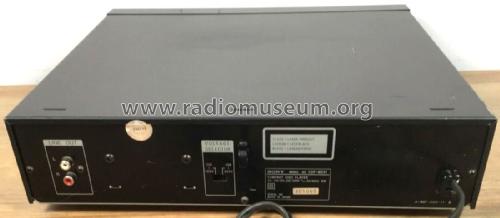Compact Disc Player CDP-M201
Sony Corporation; Tokyo
- País
- Japon
- Fabricante / Marca
- Sony Corporation; Tokyo
- Año
- 1993 ?
- Categoría
- Registrador o reproductor de sonido o visual
- Radiomuseum.org ID
- 316636
- Numero de transistores
- Hay semiconductores.
- Semiconductores
- Principio principal
- Amplificador de Audio
- Gama de ondas
- - no hay
- Especialidades
- CD-Player, -Writer, MD, MOD (audio); Hi-Fi equipment
- Tensión de funcionamiento
- Red: Corriente alterna (CA, Inglés = AC) / 220-230; 240; 110-120; 220-240 Volt
- Altavoz
- - Este modelo usa amplificador externo de B.F.
- Material
- Metálico
- de Radiomuseum.org
- Modelo: Compact Disc Player CDP-M201 - Sony Corporation; Tokyo
- Forma
- Unidad para estanteria.
- Ancho, altura, profundidad
- 355 x 95 x 325 mm / 14 x 3.7 x 12.8 inch
- Anotaciones
-
A midi sized stereo hi-fi compact disc player. High Density Linear Converter, Direct Digital Sync. RCA phono Line Out sockets, jack for headphones with volume control.
Specification Laser (KSS-240A) Semiconductor laser Wavelength 780 - 790 nm Frequency response 2Hz - 20kHz (±0.5 dB) Signal-to-noise ratio More than 100 dB Dynamic range More than 98 dB Harmonic distortion Less than 0.0045% Channel separation More than 95 dB Output Line Out
(phono jacks)Output level 2V (at 50 kΩ)
Load impedance over 10 kΩHeadphones
(stereo phone jack)Output level max. 10 mW
Load impedance 32 ΩVersions/Power requirements
AEP model / 220-230V AC 50/60Hz
UK model / 240V AC 50/60Hz
E model / 110-120V, 220-240V AC 50/60Hz adjustablePower consumption: 10 W
Similar to the Sony CDP-M301 Compact Disc Player which has remote control.
Made in Japan & France.
- Peso neto
- 3 kg / 6 lb 9.7 oz (6.608 lb)
- Documentación / Esquemas (1)
- - - Manufacturers Literature (Service manual CDP-M201/M301 dated 1993.3)
- Autor
- Modelo creado por Howard Craven. Ver en "Modificar Ficha" los participantes posteriores.
- Otros modelos
-
Donde encontrará 3952 modelos, 3812 con imágenes y 954 con esquemas.
Ir al listado general de Sony Corporation; Tokyo




